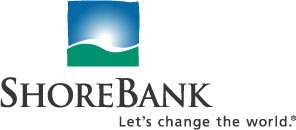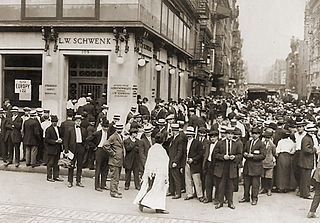Related Research Articles

The Federal Deposit Insurance Corporation (FDIC) is a United States government corporation supplying deposit insurance to depositors in American commercial banks and savings banks. The FDIC was created by the Banking Act of 1933, enacted during the Great Depression to restore trust in the American banking system. More than one-third of banks failed in the years before the FDIC's creation, and bank runs were common. The insurance limit was initially US$2,500 per ownership category, and this has been increased several times over the years. Since the enactment of the Dodd–Frank Wall Street Reform and Consumer Protection Act in 2010, the FDIC insures deposits in member banks up to $250,000 per ownership category. FDIC insurance is backed by the full faith and credit of the government of the United States, and according to the FDIC, "since its start in 1933 no depositor has ever lost a penny of FDIC-insured funds".

The savings and loan crisis of the 1980s and 1990s was the failure of approximately a third of the savings and loan associations in the United States between 1986 and 1995. These thrifts were banks that historically specialized in fixed-rate mortgage lending. The Federal Savings and Loan Insurance Corporation (FSLIC) closed or otherwise resolved 296 thrifts from 1986 to 1989, whereupon the newly established Resolution Trust Corporation (RTC) took up these responsibilities. The two agencies closed 1,043 banks that held $519 billion in assets. The total cost of taxpayers by the end of 1999 was $123.8 billion with an additional $29.1 billion of losses imposed onto the thrift industry.

A community development bank (CDB) or Community Development Financial Institution (CDFI) is a development bank or credit union that focus on serving people who have been locked out of the traditional financial systems such as the unbanked or underbanked in deprived local communities. They emphasize the long term development of communities and provide loans such as micro-finance or venture capital.
The Continental Illinois National Bank and Trust Company was an American bank established in 1910, which was at its peak the seventh-largest commercial bank in the United States as measured by deposits, with approximately $40 billion in assets.
A community development financial institution (US) or community development finance institution (UK) - abbreviated in both cases to CDFI - is a financial institution that provides credit and financial services to underserved markets and populations, primarily in the USA but also in the UK. A CDFI may be a community development bank, a community development credit union (CDCU), a community development loan fund (CDLF), a community development venture capital fund (CDVC), a microenterprise development loan fund, or a community development corporation.
United Commercial Bank was an overseas Chinese bank in the United States, based in San Francisco, California. It was a subsidiary of UCBH Holdings. Founded in 1974 as United Federal Savings and Loan Association, it changed its name to United Savings Bank, and finally United Commercial Bank in 1998. It had operations and branches located in the San Francisco Bay Area, Sacramento, Stockton, Los Angeles and Orange counties, New York, Boston, Greater Seattle Area, Hong Kong, Atlanta, Houston, Shanghai and two representative branches in Taipei, Taiwan and Shenzhen, China. United Commercial Bank was closed by regulators on November 6, 2009; it was the 120th U.S. bank to fail in 2009, and it had $11.2 billion in assets at the time of the bank failure. East West Bank of Pasadena, California, acquired all the deposits of UCBH.

Flagstar Financial, Inc. (FLG), is a bank holding company for Flagstar Bank headquartered in Hicksville, New York. In 2023, the bank operated 395 branches in New York, Michigan, New Jersey, Ohio, Florida, Arizona and Wisconsin. Branches used to be operated under the names Queens County Savings Bank, Roslyn Savings Bank, Richmond County Savings Bank, Roosevelt Savings Bank, and Atlantic Bank in New York; Garden State Community Bank in New Jersey; Ohio Savings Bank in Ohio; and AmTrust Bank in Arizona and Florida. However, they rebranded all of these under the Flagstar name on February 21, 2024. FLG is on the list of largest banks in the United States and is one of the largest lenders in the New York City metro area.

ShoreBank was a community development bank founded and headquartered in Chicago. At the time of its closing it was the oldest and largest such institution, and in 2008 had $2.6 billion in assets. It was owned by ShoreBank Corporation, a regulated bank holding company.

"Too big to fail" (TBTF) is a theory in banking and finance that asserts that certain corporations, particularly financial institutions, are so large and so interconnected that their failure would be disastrous to the greater economic system, and therefore should be supported by government when they face potential failure. The colloquial term "too big to fail" was popularized by U.S. Congressman Stewart McKinney in a 1984 Congressional hearing, discussing the Federal Deposit Insurance Corporation's intervention with Continental Illinois. The term had previously been used occasionally in the press, and similar thinking had motivated earlier bank bailouts.

First Citizens Bancshares, Inc. is a bank holding company based in Raleigh, North Carolina and one of the largest banks in the United States. Its primary subsidiary is First Citizens Bank, which operates over 500 branches in 23 states. A second subsidiary is Silicon Valley Bank, which operates 39 offices in 15 states.
FBOP Corporation was a financial services company based in Oak Park, Illinois, United States. As of mid-2009, it had $18.5 billion in assets and was the 46th largest bank holding company in the United States. On October 30, 2009, FBOP's banking subsidiaries were closed by their chartering agencies and the Federal Deposit Insurance Corporation was appointed as their receiver. The company had over 4064 employees.

A bank failure occurs when a bank is unable to meet its obligations to its depositors or other creditors because it has become insolvent or too illiquid to meet its liabilities. A bank typically fails economically when the market value of its assets falls below the market value of its liabilities. The insolvent bank either borrows from other solvent banks or sells its assets at a lower price than its market value to generate liquid money to pay its depositors on demand. The inability of the solvent banks to lend liquid money to the insolvent bank creates a bank panic among the depositors as more depositors try to take out cash deposits from the bank. As such, the bank is unable to fulfill the demands of all of its depositors on time. A bank may be taken over by the regulating government agency if its shareholders' equity are below the regulatory minimum.
Silver State Bank was an American commercial bank based in Nevada that failed in 2008. The bank had 17 branches in the Las Vegas and Phoenix metropolitan areas and loan operations across the western United States. The bank's assets were acquired by Zions Bancorporation, a bank holding corporation with $2 billion in assets.

Wachovia was a diversified financial services company based in Charlotte, North Carolina. Before its acquisition by Wells Fargo and Company in 2008, Wachovia was the fourth-largest bank holding company in the United States, based on total assets. Wachovia provided a broad range of banking, asset management, wealth management, and corporate and investment banking products and services. At its height, it was one of the largest providers of financial services in the United States, operating financial centers in 21 states and Washington, D.C., with locations from Connecticut to Florida and west to California. Wachovia provided global services through more than 40 offices around the world.
First Midwest Bancorp, Inc. was headquartered in Chicago, Illinois, just east of O'Hare Airport. The company's predecessor traces back to Joliet, Illinois. From there the company has grown to serve many Chicago suburbs including northwest Indiana, downstate Illinois, southeast Wisconsin and the Quad Cities area including Iowa. First Midwest Bank is one of the largest banking institutions in the United States

OneUnited Bank is an African-American-owned and managed Massachusetts-chartered trust company headquartered in Boston, Massachusetts. It is also registered by the Federal Deposit Insurance Corporation (FDIC), and certified as a community development financial institution (CDFI) by the United States Department of Treasury. As of April 30, 2018, OneUnited Bank maintained $661.2 million in total assets.
Bank United Corporation, headquartered in Houston, Texas, was a broad-based financial services provider and the largest publicly traded depository institution headquartered in Texas before its merger with Washington Mutual in 2001. Bank United Corp. conducted its business through its wholly owned subsidiary, Bank United, a federally chartered savings bank. The company operated a 155-branch community banking network in Texas, including 77 in the Dallas/Fort Worth Metroplex, 66 in the greater Houston area, five in Midland, four in Austin, and three in San Antonio; operated 19 SBA lending offices in 14 states; was a national middle market commercial bank with 23 regional offices in 16 states; originated mortgage loans through 11 wholesale offices in 10 states; operated a national mortgage servicing business serving approximately 324,000 customers, and managed an investment portfolio. As of June 30, 2000, Bank United Corp. had assets of $18.2 billion, deposits of $8.8 billion, and stockholder's equity of $823 million.
UGAFODE Microfinance Limited (MDI), commonly known as UGAFODE, is a microfinance institution in Uganda. It is registered and licensed as microfinance deposit-taking institution (MDI) by the Bank of Uganda, the Central Bank and national banking regulator. UGAFODE was the fourth MDI registered in Uganda.
Inland Bank & Trust was an Oak Brook, Illinois finance company controlled by Inland Real Estate Group until mid-2023. With all of its ten branches located in Chicago's western suburbs, the bank invested approximately one-third of its assets in commercial real estate.
Pan American Bank & Trust is a U.S. Federal Deposit Insurance Corporation-insured, privately held bank based in Melrose Park, Illinois with $316 million in assets and $288 million in deposits. The bank is wholly owned by American Bancorp of Illinois, Inc., a bank holding company duly registered with the Federal Reserve System. It has six offices in and around Chicago, IL: Melrose Park, Bellwood, Bloomingdale, Palatine, Little Village and Sauganash in Chicago.
References
- ↑ "Mission". Archived from the original on August 2, 2017.
- ↑ "Politically Connected ShoreBank of Chicago Fails and Reincarnated at Taxpayer Expense". Problem Bank List. August 21, 2010.
- ↑ Chicago's ShoreBank fails, is bought by investors
- ↑ Execs position former ShoreBank for growth.
- ↑ "Our MDI Designation - Urban Partnership Bank". www.upbnk.com. Retrieved April 17, 2017.
- ↑ "Urban Partnership Bank turns a profit for first time". February 6, 2017.
- ↑ "Chicago's Urban Partnership Bank acquired by suburban Providence Bank & Trust". Chicago Sun Times . Chicago. Retrieved March 26, 2019.
- ↑ "Providence Bank & Trust Welcomes Urban Partnership Bank Customers"
- ↑ "Welcome to Providence Bank & Trust". Providence Bank & Trust. 2019. Retrieved October 11, 2020.
- 1 2 Urban Partnership Bank execs lay out plans for former ShoreBank
- ↑ Almost a Year After ShoreBank's Failure, Urban Partnership is Ready to Lend